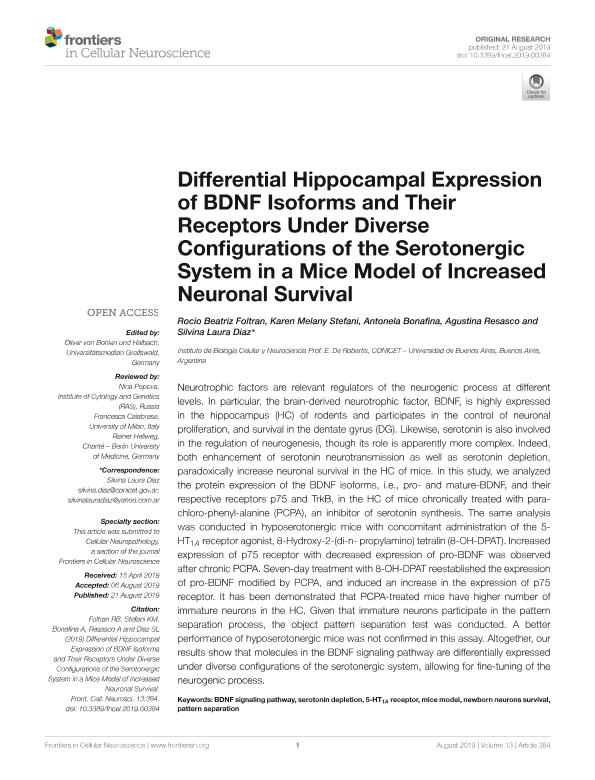Mostrar el registro sencillo del ítem
dc.contributor.author
Foltran, Rocío Beatriz

dc.contributor.author
Stefani, Karen Melany

dc.contributor.author
Bonafina, Antonela

dc.contributor.author
Resasco, Agustina

dc.contributor.author
Diaz, Silvina Laura

dc.date.available
2021-01-22T18:24:09Z
dc.date.issued
2019-08
dc.identifier.citation
Foltran, Rocío Beatriz; Stefani, Karen Melany; Bonafina, Antonela; Resasco, Agustina; Diaz, Silvina Laura; Differential Hippocampal Expression of BDNF Isoforms and Their Receptors Under Diverse Configurations of the Serotonergic System in a Mice Model of Increased Neuronal Survival; Frontiers Media S.A.; Frontiers in Cellular Neuroscience; 13; 8-2019; 1-9
dc.identifier.issn
1662-5102
dc.identifier.uri
http://hdl.handle.net/11336/123494
dc.description.abstract
Neurotrophic factors are relevant regulators of the neurogenic process at different levels. In particular, the brain-derived neurotrophic factor, BDNF, is highly expressed in the hippocampus (HC) of rodents and participates in the control of neuronal proliferation, and survival in the dentate gyrus (DG). Likewise, serotonin is also involved in the regulation of neurogenesis, though its role is apparently more complex. Indeed, both enhancement of serotonin neurotransmission as well as serotonin depletion, paradoxically increase neuronal survival in the HC of mice. In this study, we analyzed the protein expression of the BDNF isoforms, i.e., pro- and mature-BDNF, and their respective receptors p75 and TrkB, in the HC of mice chronically treated with para-chloro-phenyl-alanine (PCPA), an inhibitor of serotonin synthesis. The same analysis was conducted in hyposerotonergic mice with concomitant administration of the 5-HT1 A receptor agonist, 8-Hydroxy-2-(di-n- propylamino) tetralin (8-OH-DPAT). Increased expression of p75 receptor with decreased expression of pro-BDNF was observed after chronic PCPA. Seven-day treatment with 8-OH-DPAT reestablished the expression of pro-BDNF modified by PCPA, and induced an increase in the expression of p75 receptor. It has been demonstrated that PCPA-treated mice have higher number of immature neurons in the HC. Given that immature neurons participate in the pattern separation process, the object pattern separation test was conducted. A better performance of hyposerotonergic mice was not confirmed in this assay. Altogether, our results show that molecules in the BDNF signaling pathway are differentially expressed under diverse configurations of the serotonergic system, allowing for fine-tuning of the neurogenic process.
dc.format
application/pdf
dc.language.iso
eng
dc.publisher
Frontiers Media S.A.

dc.rights
info:eu-repo/semantics/openAccess
dc.rights.uri
https://creativecommons.org/licenses/by-nc-sa/2.5/ar/
dc.subject
5-HT1A RECEPTOR
dc.subject
BDNF SIGNALING PATHWAY
dc.subject
MICE MODEL
dc.subject
NEWBORN NEURONS SURVIVAL
dc.subject
PATTERN SEPARATION
dc.subject
SEROTONIN DEPLETION
dc.subject.classification
Neurociencias

dc.subject.classification
Medicina Básica

dc.subject.classification
CIENCIAS MÉDICAS Y DE LA SALUD

dc.title
Differential Hippocampal Expression of BDNF Isoforms and Their Receptors Under Diverse Configurations of the Serotonergic System in a Mice Model of Increased Neuronal Survival
dc.type
info:eu-repo/semantics/article
dc.type
info:ar-repo/semantics/artículo
dc.type
info:eu-repo/semantics/publishedVersion
dc.date.updated
2020-12-09T20:16:00Z
dc.journal.volume
13
dc.journal.pagination
1-9
dc.journal.pais
Suiza

dc.journal.ciudad
Lausanne
dc.description.fil
Fil: Foltran, Rocío Beatriz. Consejo Nacional de Investigaciones Científicas y Técnicas. Oficina de Coordinación Administrativa Houssay. Instituto de Biología Celular y Neurociencia "Prof. Eduardo de Robertis". Universidad de Buenos Aires. Facultad de Medicina. Instituto de Biología Celular y Neurociencia; Argentina
dc.description.fil
Fil: Stefani, Karen Melany. Consejo Nacional de Investigaciones Científicas y Técnicas. Oficina de Coordinación Administrativa Houssay. Instituto de Biología Celular y Neurociencia "Prof. Eduardo de Robertis". Universidad de Buenos Aires. Facultad de Medicina. Instituto de Biología Celular y Neurociencia; Argentina
dc.description.fil
Fil: Bonafina, Antonela. Consejo Nacional de Investigaciones Científicas y Técnicas. Oficina de Coordinación Administrativa Houssay. Instituto de Biología Celular y Neurociencia "Prof. Eduardo de Robertis". Universidad de Buenos Aires. Facultad de Medicina. Instituto de Biología Celular y Neurociencia; Argentina
dc.description.fil
Fil: Resasco, Agustina. Consejo Nacional de Investigaciones Científicas y Técnicas. Oficina de Coordinación Administrativa Houssay. Instituto de Biología Celular y Neurociencia "Prof. Eduardo de Robertis". Universidad de Buenos Aires. Facultad de Medicina. Instituto de Biología Celular y Neurociencia; Argentina
dc.description.fil
Fil: Diaz, Silvina Laura. Consejo Nacional de Investigaciones Científicas y Técnicas. Oficina de Coordinación Administrativa Houssay. Instituto de Biología Celular y Neurociencia "Prof. Eduardo de Robertis". Universidad de Buenos Aires. Facultad de Medicina. Instituto de Biología Celular y Neurociencia; Argentina
dc.journal.title
Frontiers in Cellular Neuroscience
dc.relation.alternativeid
info:eu-repo/semantics/altIdentifier/doi/http://dx.doi.org/10.3389/fncel.2019.00384
dc.relation.alternativeid
info:eu-repo/semantics/altIdentifier/url/https://www.ncbi.nlm.nih.gov/pmc/articles/PMC6712164/
Archivos asociados
